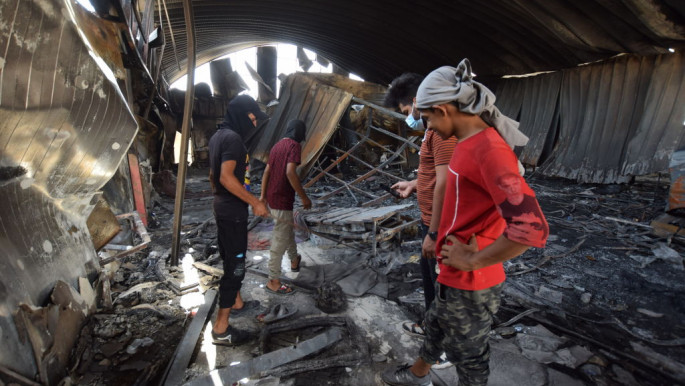![A youth walks in front of a large poster of Iraq's populist Shia cleric Moqtada Sadr, in Sadr City, east of the capital Baghdad, on 15 July 2021. [Getty]](/sites/default/files/styles/image_360x240/public/2021-07/GettyImages-1233991997.jpg?h=c1d1da2a&itok=hUrxKhlk)
Muqtada al-Sadr: Why is the powerful Shia leader boycotting Iraq's election?
![A youth walks in front of a large poster of Iraq's populist Shia cleric Moqtada Sadr, in Sadr City, east of the capital Baghdad, on 15 July 2021. [Getty]](/sites/default/files/styles/image_360x240/public/2021-07/GettyImages-1233991997.jpg?h=c1d1da2a&itok=hUrxKhlk)
Last week, powerful Shia figurehead Muqtada al-Sadr announced his withdrawal from the upcoming October elections in Iraq.
“I inform you that I will not be participating in the elections. For the nation is more important than all of that,” al-Sadr said last Thursday.
“Do not sell your homeland [to the corrupt] at any price, it is more valuable than anything else,” Sadr added, in a televised speech aired on local Iraqi media.
"The Sadrists run the Ministry of Health and Ministry of Electricity and both sectors have corruption, so his announcement was to clean up his movement"
Al-Sadr’s withdrawal from politics came three days after a deadly fire tore through a hospital in Iraq's southern city of Nasiriyah.
At least 62 people were killed, 30 were wounded, and 32 are still missing following the blaze at a Covid-19 unit at the hospital, according to Iraq's Independent High Commission for Human Rights.
Iraq’s High Electoral Commission (IHEC) has rejected al-Sadr’s withdrawal from the legislative elections, reaffirming that the vote will be held as scheduled despite attempts to postpone it.
Dhia al-Hindi, a Karbala-based political activist and a member of the Imtidad Movement, told The New Arab that al-Sadr’s withdrawal came after a series of failings by the health and electricity ministries, both run by Sadrist ministers.
“Sadr’s withdrawal is irreversible. And of course, that means all Sadrist candidates will be out of October’s elections unless some unexpected developments happen to make Sadr come back,” al-Hindi said.
The Imtidad Movement was officially founded in February 2021 as part of a host of new Iraqi political parties pioneering anti-sectarian sentiments and inclusive Iraqi nationalism. All of its members were part of the 2019 October revolution that railed against corruption and rocked the country’s ruling elites.
“I hope we are going to fill the gap that Sadr has left. As well as having an independent candidate we do not have any affiliation with Iran-backed parties or US-supported parties, that helps us to reform a new political bloodline in the upcoming government,” al-Hindi said.
|
|
In the 2018 election, al-Sadr’s Sairoon bloc won 54 of the parliament’s 329 seats, becoming the largest party.
“Muqtada al-Sadr withdrew from the next election just in the media, but nothing is official,” Ahmed Sameer, a 35-year-old Basra-based resident told The New Arab.
“The Sadrists run the Ministry of Health and Ministry of Electricity and both sectors have corruption, so his announcement was to clean up his movement after getting a bad reputation since they won the majority of parliament seats,” he added.
“I will never vote for anyone in the next elections, we all hope that Iraq will be ruled by a good person but unfortunately all of them have an affiliation to outside [powers], mostly supported by Iran-backed wings,” said Sameer.
"Al-Sadr's announcement to be outside of the next government was to send a message to all political parties that the political process will collapse if the Sadrist movement withdraws from it"
He added: “The government, with or without al-Sadr, will do nothing in favour of the people, they work in their own favour, they have run Iraq for more than 18 years. What will they bring to us? They bring us poverty, crime, corruption, and zero services”.
For political analyst and activist Ghanim al-Abid, Sadr’s withdrawal leaves many unanswered questions as to his motivations.
“The Sadrist movement’s withdrawal from the early elections has raised many question marks, considering that the Sadrist movement was keen to hold the elections on time,” he told The New Arab.
In the past, the movement had warned against postponing early elections as it was convinced it would win the premiership due to a loyal following of millions, unlike other Shia parties, according to al-Abid.
“But al-Sadr's announcement to be outside of the next government was to send a message to all political parties that the political process will collapse if the Sadrist movement withdraws from it,” al-Abid said.
“The message was sent to their opponents such as Asa’ib Ahl al-Haq, who have armed disputes with them, and for other parties who are loyal to Khamenei,” he added.
“I think Sadr will come back from his decision and participate in the election, but I am sure the election date will be postponed to next April 2022”.
"The government, with or without al-Sadr, will do nothing in favour of the people, they work in their own favour"
But this is not the first time that Muqtada al-Sadr has withdrawn from the political process in Iraq, only to return at a later date.
“When the election date comes, the Sadrists will put pressure on their leader to go back on his decision, and he will agree to be active in the election, so nothing changes,” Hussein Munir, a 28-year-old Baghdad-based resident said.
“I decided to support the new candidates who were protesting to get our rights, but I am concerned that they will reunite with other parties who were part of the previous government,” Munir added.
“We have no patience to lose more years waiting for a good character to run Iraq, we will choose the good candidates that we hope will build back Iraq to its position as it was in the 1970s,” Munir said.
Azhar Al-Rubaie is a freelance journalist based in Iraq. His writing focuses on a variety of issues, including politics, health, society, wars, and human rights.
Follow him on Twitter: @AzherRubaie



